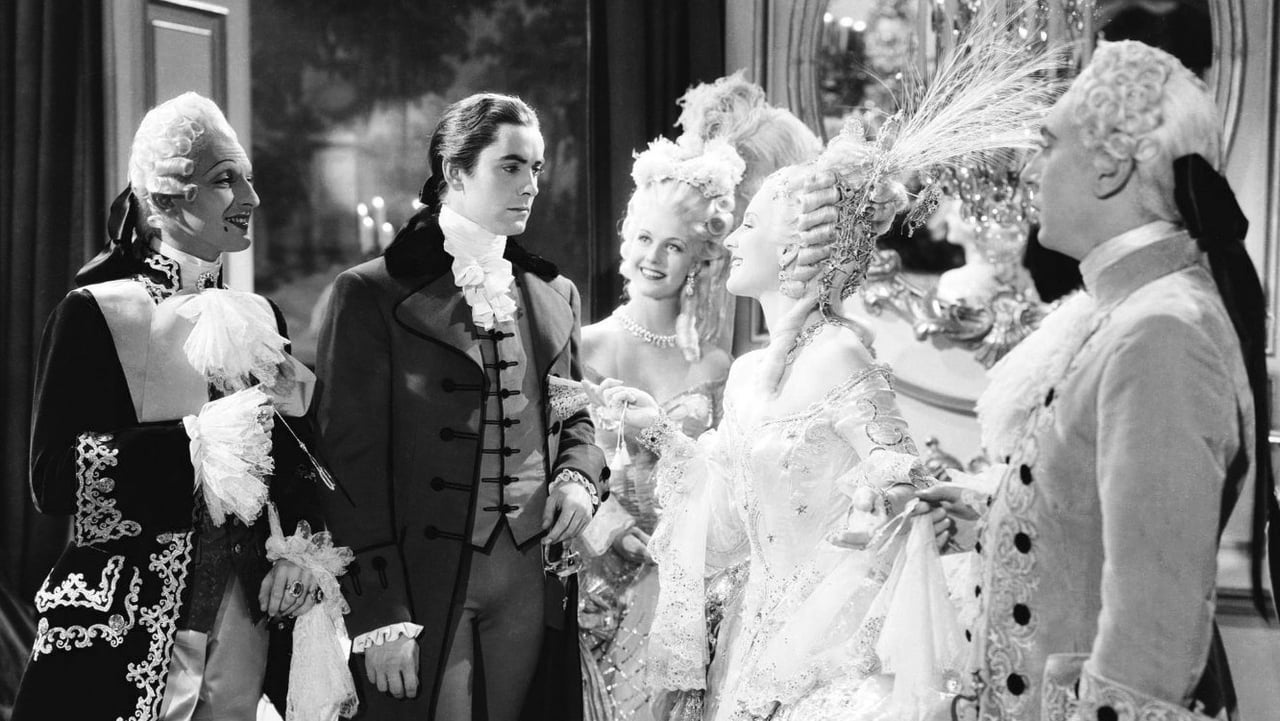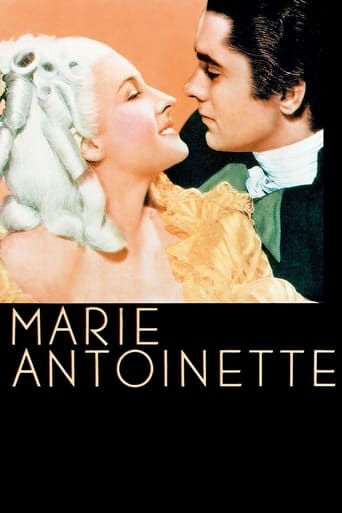

Waste of time
... View MoreAmateur movie with Big budget
... View MoreThere is just so much movie here. For some it may be too much. But in the same secretly sarcastic way most telemarketers say the phrase, the title of this one is particularly apt.
... View MoreThis is a must-see and one of the best documentaries - and films - of this year.
... View MoreMade directly after Irving Thalberg's death but arranged by him beforehand this was Norma's final solo showcase. A mixture of the loss of her behind the scenes champion, poor script judgment and her vanity which caused her to turn down possible career savers Mrs. Miniver and Old Acquaintance lead to her days as a top star coming to an end. She still had a few decent pictures in her future, most notably The Women, but this is the last of her big star vehicles and her final big success as the main star of a film.But this is certainly a grand way to end her time at the top. Norma does well in the lead her occasional lapses into grandiosity are well suited to a queen and don't get in the way of her characterization like they often did in several of her other films and her smaller moments are well played. Although this really should have been in color, the sets, wigs and costumes are almost impossibly lavish and are dazzling even in B&W. It's an enjoyable if questionably accurate historical account of Marie's rise and fall.Aside from Shearer Robert Morley gives a gem of a performance as the not terribly bright Louis XVI, never making him seem a simpleton just a gentle man unequal to the role thrust upon him by birth. There are a few other good performances from Gladys George as the cheap but flashily dressed Madame du Barry and Joseph Schildkraut as the queen's venal cousin. Tyrone Power is impossibly handsome but his part is really window dressing so he doesn't make much of an impression.Fine through they all are the film would be nothing without Norma. The title role requires someone whose well seasoned star power couldn't be overpowered by the sumptuous trappings and this is Norma's show straight down the line. Perhaps the one she was most suited to it's certainly one of her strongest performances. The film itself is a trifle overlong but for those who stick with it worthwhile entertainment.
... View MoreThis movie is more interesting to watch if you have a decent knowledge of the history that is being changed by it. I don't think I have ever seen such a sympathetic portrait of the French queen. She is truly presented as without flaw, a wonderful, warm woman. This makes her end truly difficult to bear, especially given the highly emotional final scenes of the movie. When they take her son from her, it is hard to hold back the tears.The truth, of course, was otherwise. This is, therefore, a whitewashing of the historical Marie Antoinette, and it is worth asking why.In part, it seems to be a conservative's rewrite of history. The revolutionaries are portrayed as uniformly bad, so this is a condemnation of revolution and a positive presentation of absolute monarchy. MGM had done the same sort of thing just a few years before with the much better A Tale of Two Cities, which also centers on the French Revolution.I suspect MA is also whitewashed so that Norma Shearer would have a sympathetic character to portray. That backfires, though, at least from hindsight. A good actress could do more with a complex character who has merits but also flaws. Here, MA is less difficult to portray, and comes off as less interesting than, say, Shearer's portrayals in "The Women" or some of her other better-remembered movies. She may not have been the greatest of actresses, but she would have been more interesting, and more memorable, if the character had not been written in such a one-dimensional fashion.There are lots of lavish ballroom scenes, lots of magnificent costumes, by Adrian. If you like that, you will love this movie. It's just a shame that the characters so beautifully costumed don't come off as more interesting, especially given the exceptional length of this movie.
... View MoreThe 1938 version of the story of the ill-fated queen of France boasts amazing aspects and not so good aspects as well. However,we must bear in mind that the film is loosely based on Stefan Zweig portrayal and that in 1938 every single reference that might be perceived as inappropriate had to be removed for the public decency. The good: -Norma Shearer as Marie Antoinette is simply perfect in every detail. It's a towering performance from one of the most talented actresses in old Hollywood, almost a tribute to Marie Antoinette. Without Shearer the film would have been almost unbearable to watch and we can clearly say that she carries on her shoulder the entire picture. - The film manages effortlessly to show the rise and fall of M.A. and the sudden change of her fortune from the opulent splendour of the court of Versailles to the frightening days of the French Revolution and how the revolutionaries were cruel with M.A.,depriving her of her only living son. That scene is one of the most moving scene ever put on a film. The not so good: - The script is somewhat full of holes. We never understand why and when M.A. changes from spoilt queen to devoted mother and courage woman. There's no explanation of her actions and many facts of her life are completely invented such as the issue of how the rivalry between M.A. and Du Barry turned, the supposed isolation decided by the King Louis XV and Du Barry for M.A. and the Douphin Louis, the decision of Louis XV to banish M.A. and abolish the marriage of M.A. and Louis because she mistreated his mistress, how the affair of the necklace began and evolved. Such are the most significant changes from the actual events. - The relationship between Fersen and M.A. is blown out of proportion, although for cinematic purpose. - The role of the Duke of Orleans is too forced since he never was in such intimacy with the Queen(for example in one beautiful scene they passionately kissed each other). The bad: - The dialogues are almost entirely inconceivable for the rigid etiquette of the french court and the hierarchy between the King and his relatives. Instead we see M.A. and Louis addressing to Louis XV with no reverence or submission. So is Du Barry who speaks to M.A. as she is nothing but a mere courtesan and with no tact and M.A. ,in the most awkward scene of the film, publicly speaks about her humble beginnings in front of the King and the court. - The supporting cast -exept Tyrone Power and John Barrymore- varies from useless to terribly miscast or perhaps bad conceived such as Robert Morley's King Louis XVI as a totally imbecile which is quite annoying.
... View MoreAlthough not nearly as historically accurate as it could've been, the 1938 version of "Marie Antoinette" still stands as one of the best films of the 1930s and certainly the finest ever made about the late queen of France. The high-powered and second-to-none cast includes Norma Shearer as the tragic queen and Robert Morley as King Louis XVI. Morley's sympathetic characterization of the king almost steals the picture, but there's too much happening in this film for anyone to be able to get away with that. The great John Barrymore plays Morley's father (Louis XV) with an understated cruelty and disdain for humanity. A radiant Gladys George is also on hand as his famous mistress, Madame DuBarry. Norma Shearer, one of the greatest stars of early cinema and wife to MGM production chief, Irving Thalberg, has the role of her life as the title character. Her "Antoinette" runs the gamut between frivolous coquette to protective mother and finally to one of history's most tragic figures. Shearer's silent film techniques are also put to good use near the end of the film when the totally distraught and prematurely aged queen is awaiting execution in her cell. Through her skillful well-honed hand and facial expressions, she's able to project her feelings of dread for the horrors that are about to be unleashed upon her without so much as one spoken word. A young and up-and-coming Tyrone Power is second billed in the film and his part seems more intended for box-office appeal than anything else. That said, he does an adequate job providing the love interest for Ms. Shearer, even though that subplot mostly gets in the way of the historical aspects of the film. Other cast members include an excellent Anita Louise as the queen's best friend, the Princess de Lamballe. Joseph Schildkraut rounds out the leading roles as the unctuous and oily Duke of Orleans. His voice-overs during the early days of the French Revolution give the film some much-needed gravitas and it quickly and effectively alters the mood of the entire proceedings. As any student of history knows, there's no happy ending to this story.What's truly amazing is that most modern film-goers have never even heard of Norma Shearer much less know anything about her work. Her contemporaries (i.e. Joan Crawford, Bette Davis, Greta Garbo) all outlasted her with the general public. That may be because Shearer retired soon after her husband died; her final film was 1942's forgettable "Her Cardboard Lover." The rest of the cast, however, went on to bigger and better things. Robert Morley worked forever in both films and TV as did Schildkraut. Of course, John Barrymore's body of work stands in a class by itself. Tyrone Power became one of the great superstars of cinema, dying too young at the age of 44 in 1958."Marie Antoinette" is competently directed by W.S. Van Dyke and MGM studios spared no expense for their First Lady (Shearer). The carefully constructed sets for the lavish parties at Versailles are extravagant to the extreme and the total cost of the film was astronomical for its time. Even critics of the film agree that there's an eye for detail in nearly every scene. It's unfortunate that Norma Shearer isn't as well-known as she should be in this day and age. Maybe now is the time for her "revival." The same goes for this excellent film. Compared to Sofia Coppola's modern-day well-deserved flop on the same subject, W.S. Van Dyke's "Marie Antoinette" is a film for the ages.
... View More